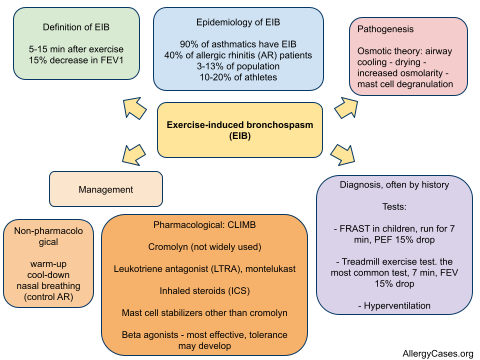The prevalence of exercise-induced bronchoconstriction (EIB) is 10% in the general population, up to 90% of those with asthma, and 50% of those with allergic rhinitis. Asthma is the most common chronic respiratory disease, affecting up to 10% of adults and 30% of children (JACI, 2011).
Pediatric Exercise Tolerance Test
Dr. Tod Olin, a pediatric pulmonary specialist at National Jewish Health, explains a cardiopulmonary exercise test. This is a test performed on children who are having difficulty breathing when exercising (http://www.njhealth.org/PETC):
Exercise-Induced Asthma
How can you spot if your child has exercise-induced asthma? Dr. Tod Olin, discusses the symptoms:
Exercise-induced bronchospasm (EIB) (click to enlarge the image):

ATS practice guideline: exercise-induced bronchoconstriction:
Exercise-induced dyspnea differential diagnosis includes exercise-induced vocal cord dysfunction (EIVCD), exercise-induced laryngomalacia (EIL) and more (http://buff.ly/1jzVPHS).
Pediatric Exercise Tolerance Test
Dr. Tod Olin, a pediatric pulmonary specialist at National Jewish Health, explains a cardiopulmonary exercise test. This is a test performed on children who are having difficulty breathing when exercising (http://www.njhealth.org/PETC):
Exercise-Induced Asthma
How can you spot if your child has exercise-induced asthma? Dr. Tod Olin, discusses the symptoms:
Exercise-induced bronchospasm (EIB) (click to enlarge the image):
ATS practice guideline: exercise-induced bronchoconstriction:
Exercise-induced dyspnea differential diagnosis includes exercise-induced vocal cord dysfunction (EIVCD), exercise-induced laryngomalacia (EIL) and more (http://buff.ly/1jzVPHS).